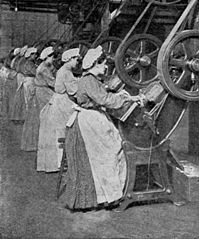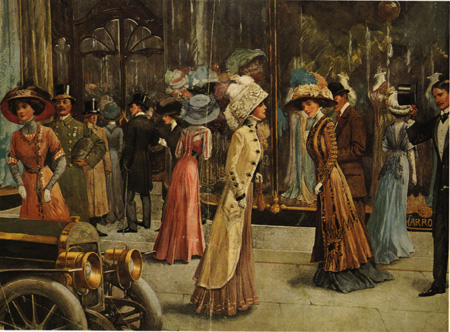Conservatism differs, however, on where to draw the line at government services. Traditional conservatives have been OK with things like reasonable regulation of food and safety standards, infrastructure projects such as roads and bridges, public education, parks, libraries, etc. They have also been amenable to spending on the so-called "safety net" - services targeting the poor and needy, designed to roughen the edges of capitalism, granted they are of a temporary nature, needs-based, and unlikely to contribute to a "culture of dependency".
More recently, modern conservatism has experienced a shift, as reflected in the platform of the Republican party and mainstream conservative rhetoric, towards much greater hostility towards government services in general, and a demonization of government itself as well as those who might be receiving so-called "handouts" (the implication being a handout is undeserved, as opposed to deserved benefit). This type of thinking is much more in line with traditional libertarianism, which at the extremes views all government save military and security concerns as not merely economically ineffective, producing weak growth and stagnation, but ultimately immoral and unjust taxation and regulation of private property. To this line of thought, a man's money or business is his own, and he should not be responsible for paying taxes to a government that redistributes resources to the undeserving.
Interestingly, the political philosophy of libertarianism shares its name with the philosophical position on human agency known as libertarian free will. Libertarian free will, an increasingly minority view in the philosophical and scientific community, assumes that the human mind, owing to the fantastic complexity of consciousness, has a special property that exists no where else in nature, namely that humans are able to make choices entirely free from prior causes or impulses, or at least free enough that something like free will can be said to exist.
This is in direct opposition to the views called determinism or compatibilism, both of which acknowledge that human do indeed make choices, but that those choices originate in prior causes. Ultimately no different than computers or anything else in nature (as uncomfortable the prospect may be to some), these prior causes extend back in time in what is referred to as a "causal chain", and which human conscious can ever only be only partially aware. Thus, when we make choices, we understand some of what impulses have given rise to our final decisions, but because we are only ever aware of these impulses after the fact, and furthermore only ever partially aware of them, we simply can't claim any ultimate responsibility for them. This implication for the destruction of personal responsibility and intention is usually the greatest problem most people have with the view that no one is his own agent. The determinist response is actually quite simple, but instead of laying it out here, I'll link to Tom Clarke's excellent essay on it.
Given conservatism's emphasis on personal responsibility, it would make sense that conservatives would embrace libertarian free will. I know of no direct polling on the question (a difficult proposition, given that the term "free will" is fraught with philosophical complications that need to be teased apart), but I would guess that most would be quite uncomfortable with a determinist account of human agency.
And this shows up frequently in conservative rhetoric. "Liberals" are routinely characterized as assuming that people have less agency than they really do. Calls for being tough on crime, increased personal responsibility, accountability, and moral clarity are rooted in the notion that "excuses" are being made for people. The "nanny state" is metaphor that describes government provision of services to an infantilized public, unable to think for itself, without the free will and agency of mature adults. "Helping" people fosters dependency in the same way that a nanny taking care of a child hinders his ability to become self-reliant.
Yet here we come to a strange tension in the conservative worldview. At once people are assumed to have greater free will and agency, but at the same time these same people are supposedly in danger of, in the form of provided government services, a weakening of self-agency. One might easily imagine that if people already had greater levels of agency, they would be likewise less prone to having their agency sucked out of them by a reliance on the state for some service or another.
I don't mean to completely dismiss the prospect of people's agency being weakened by government services. Indeed, there are points at which government services crowd out social, cultural or economic structures what would otherwise operate at the behest of motivated citizens. We do, after all, live in a generally capitalist, not communist, society. The state certainly does not provide for our every need. The vast majority of Americans have jobs and earn money with which we buy food, housing, utilities and consumer goods. If any of these were given to us for free, many of us would likely not - simply out of rational self-interest - opt to purchase out own.
So, what exactly is this "culture of dependency" that conservatism seems increasingly interested in? While there is still diversity of opinion among conservatives on this issue, it is quite telling that their leading candidate in the '12 election, Mitt Romney, was recently recorded engaging an audience of wealthy donors with an extended monologue in which he invoked audacious claims of a 47% of the population essentially mooching, suckling at the government teat,
"who are dependent upon government, who believe that they are victims, who believe the government has a responsibility to care for them, who believe that they are entitled to health care, to food, to housing, to you-name-it. That that’s an entitlement. And the government should give it to them."The 47% he so infamously referred to are those who do not pay income tax. However, most indeed pay payroll taxes or are retirees on social security who had ostensibly paid into it all their lives, and all pay sales tax. Romney seems to be wildly conflating two very different categories of people: those who receive government services yet are otherwise hard-working and self-reliant, and those who simply want to take and never contribute. This second category is the group that conservatives have historically demogogued, expending the majority of their ire on them and the liberals who "enable" them.
Yet is it unclear who these people are or ever were. "Welfare queen" was once a popular image, a thinly racialized shibboleth, evocative of a inner-city black woman sitting around in her government-provided housing, sleeping with multiple partners and having babies "just to receive their welfare". Now, I've actually spent a good deal of time among the inner city poor, both in my work in their neighborhoods, as well as educating their children, enough to examine this portrait with my own eyes. These individuals do indeed exist, however they are exceedingly rare. And the story is far more complicated.
Most families in these communities are working, however only at low-wage jobs (a student in my class yesterday just mentioned that her mother has been working at Del Taco for 9 years). Government provision of food stamps, day care or health services merely supplement fragile economic circumstances, and in no way are an incentive to remain poor. The reality of our economy is that a large segment of it runs on low-wage, low-skill labor. This creates a market in which opportunities for higher pay will always be limited only to those with the human capital (developing out of societal capital) to acquire the necessary skills. It must be remembered that no one wants to be poor.
Here might be a good place to dig deeper into the psychology of agency. Why is it that one person stays working at Del Taco for nine years, while another quits after one day?
True story: At the tender age of 17, Super Vidoqo was once hired to work at Taco Bell. After a brief training session, I was set to work scrubbing hardened bean crust off dirty pans. The second time the manager took a rude tone of voice with me, ordering me to "scrub harder", I walked right out the back door, never to return. I would rather apply for $150 in monthly food stamps and sleep on couches - which I then did - than subject myself to such indignities. Aha, you say, the government supported your idolatry - err, ...idlety! Well, in the short term, it did. But no longer wasting time scrubbing beans for a grease-angered manager, I was free to apply my capital elsewhere, namely by networking myself into a romance with a college-track lass who's wealthy father paid her rent (and by proxy, mine), while she and I entered college. 10 years later, after a number of decidedly low-wage, low-skill jobs, and countless hours of night school, I left university with a Master's degree.
But as I stood there in my black shoes and Taco Bell baseball cap, deciding whether to stay or go, what motivated my reasoning? If you asked me then, it was clearly the supervisor's humiliating management style. But despite the humble aura of the tale, I should admit that I was a rather bright young man. Naturally so? Maybe. But mind this: both of my parents graduated college and had professional careers. My childhood was richly endowed with quality literature, enrichment activities and cognitively advanced conversations with adults. My school was largely filled with other middle-class children of educated and professional parents, and my neighborhood was largely safe and promoted a sense of community peace and harmony. There were successful neighborhood businesses and the parks, roads and libraries were clean and well-funded.
All wasn't perfect. There were psycho-dynamic family issues involving depression, anger, hostility and rebellion. But within the larger structure of societal and human capital, my siblings and I have all turned out quite well, educated and professionally-tracked. No one works at a fast-food franchise.
But what of my student's mother? Nine years ago her daughter would have been around 5 years old, just entering kindergarten. She's mentioned her father. She told a story last week of his altercation with a repo-man in which he punched the man in the face. My student proudly recounted her defense of her "dad's [expletive] truck", by jamming a screwdriver in the ignition. That's about all I know of her story, other than her being in a low-level science class, struggling to maintain focused on her studies.
Sadly, family income and education is highly correlated with generational poverty. Poor students are at much higher risk for a host of social problems - delinquency, drug abuse, teen pregnancy. They tend to have lower levels of cognitive development, emotional regulation, vocabulary and general world and academic knowledge. Their development is not only hindered by a lack of stimulating input, but a range of life struggles that actively hinder development, not the least of which is increased levels of stress brought about by the effects of poverty on the family unit.
These things are all directly determinative, and in aggregate are highly predictive of life outcomes among different sectors of society. It is simply factually incorrect to assume that everyone have similar levels of agency. They may have opportunities, hypothetically, but in reality their ability to take advantage of those opportunities is dependent on their agency, which in turn is dependent on the kinds of societal and human capital I have discussed. The social science literature is replete with evidence for this.
Which returns us to the question of government's effects on human agency. Given the large amount of data on social structures that, through human development, determine agency, to what extent do government services affect it? The conservative argument is that it creates a shift in human behavior away from self-determination and towards dependency. But what evidence is there of this? And how does it stack up against an individual's lifetime experience, the amount of human capital he has developed, and which affects his entire conscious perspective every waking moment of his life?
A simple thought experiment would be to simply imagine that no government services are on offer, and ask whether he would make any different decisions. Given the fact that most of the working poor receive very little in the way of government help, it's hard to imagine any real difference at all. The elderly might indeed have to work longer before retiring. But are these the moochers conservatives have in mind? I don't really think so. Republican Vice Presidential candidate Paul Ryan has been accusing Obama of wanting to cut medicare and social security spending (a rather ironic charge, considering the self-professed Ayn Rand devotee and opponent of moochers everywhere had previously pushed those very cuts himself). In line with Romney's 47% comments, Obama is currently being referred to as the food stamps president, many prominent conservatives arguing his giving states more leniency over federal welfare subsidies being a back-door attempt to "encourage dependency".
Who is the average food stamp recipient? Is the paltry welfare they get from the government encouraging their sense of dependency and entitlement? What if we refused them food stamps? What effect would this have on the poor? My guess would be that the poor would still be just as poor, only a few hundred dollars a month poorer. There might be some tiny portion of individuals for whom that small amount of cash was in some subliminal way contributing to a subtle lack of extra effort to maybe fill out a community college application, or save a little bit harder, or maybe scan the job listings for work that was a tad more challenging. Maybe. But one could as easily make the opposite case: that in a real way the extra cash allowed them to get out of debt, buy some better food, take their kid to the movies or a museum, or some nicer clothes, thereby increasing the societal capital that in aggregate promotes within the family a sense of upward mobility. Subliminally, it could likewise be argued that, some portion of stress being relieved, new possibilities and horizons might open up that were heretofore nonexistent.
"Dependency" is an interesting word. It is generally used to characterize a sort of psychological, behavioral disposition in which personal agency is sacrificed for a "free ride". But are we not all dependent? As I have detailed, I can personally attest to the privileges I have enjoyed in my life - entirely predicted in the social sciences literature - that I have in a very real sense been "dependent" on for my relative life success. I was dependent on my educated, professional parents. I was dependent on the love I received from my father who played catch with me even though he was tired after a long day at work. I was dependent on my mother's interest in facilitating my sense of agency as she allowed my help her in the kitchen, all the while developing my cognitive capacities by engaging in complicated dialogue and inquitive conversation.
It seems dependency can be thought of in two ways. One, as a crutch in which agency is not developed but rather allowed to stagnate without stimulation, and another in which the act of development itself is dependent on stimulation. When conservatives speak of dependency, they refer to a lack of stimulation that one's agency might have received were it required to progress unaided. But is the development not then dependent on something else? Those of us who have been fortunate to have had our agency developed by stimulation from high levels of societal capital - friends, a family, community - can get by pretty easily without dependency on government welfare. (However, it must be said, we are still hugely dependent on the many varieties of modern state infrastructure, things like roads, schools, police, fire, libraries, parks, safety inspections, etc.) And we are still enormously dependent on the social and human capital we continue to enjoy. I am dependent on my work ethic. I am dependent on my emotional regulation and self-control. I am dependent on the subtle sense of confidence that comes from being a relatively handsome white male with a professional occupation, a wonderful wife and charming, intelligent daughters. These are things of anti-despair. On them I depend.
Liberals often describe all of this as "privilege". Privilege is leveraged, and it is a form of dependency. Just as a businessman is dependent on his stock of product to sell, man is dependent on his human and societal capital to leverage, to "sell" himself in the world. Inherent in the concept of privilege is dependency. In the children's game "king of the hill", one's titular position affords considerable advantage. Advantage is dependent on a privileged position.
Another word conservatives decry is "entitlement", as in the entitlement programs and the sense of entitlement that is said to be engendered among recipients. Yet what of the sense of entitlement felt by the privileged who refuse to acknowledge their entitlement, and pretend to have somehow "earned" it or "deserve" it. Witness Republican candidate Romney, heir to a vast fortune, who after leveraging his own privilege, expresses explicit disdain for those with a sense of "entitlement". Witness his remarks to a reporter when asked how he feels about his income being taxed at a lower rate than others. His lower rate was the
"right way to encourage economic growth -- to get people to invest, to start businesses, to put people to work."Talk about a "culture of entitlement".
The fact that today I make a middle class income and am not still working at Taco Bell is dependent on my privilege, it is my dependency. I do not know whether my student's mother has ever received food stamps. But the fact that she has been wrapping burritos for nine years is dependent on her lack of privilege. So when conservatives speak of "a culture of dependency" - if such a thing as they envision it even really exists, much less has anything but those most marginal import in society, given the numbers of actual citizens one could even describe as such - they might expand their understanding of the term's insight into human behavior and the ways in which society works, as evidenced by what decades of social science data tells us. They might expand their conceptualization of who is a "maker", and who is a "taker". Might they also see the complexity of human nature and the development of agency as something far larger and more subtle than that which a paltry bit of government aid could ever have much of an effect upon.
A Buddhist exhortation asks that we, in the end, point our "rivers of compassion" inward, not merely projecting kindness outward, but into ourselves as well. So too might conservatives turn their "rivers of ire" inwards, recognizing the role of privilege in their own lives, and hopefully find in those waters some humility and compassion still afloat.











And this is all highly correlated with family capital. In a 1987 paper , Lareau describes parent night at two schools of different SES make-ups, fictionally named Colton (low -SES) and Prescott (high-SES).(1)
These are all situations in which there is little a teacher can do but work with the student when he or she shows up in class. But that is obviously not enough. How is it then, that we a society, might intervene in a way that secures for the child a proper education?
1 - Social Class Differences in Family-School Relationships: The Importance of Cultural Capital, Author(s): Annette LareauSource: Sociology of Education, Vol. 60, No. 2 (Apr., 1987), pp. 73-85